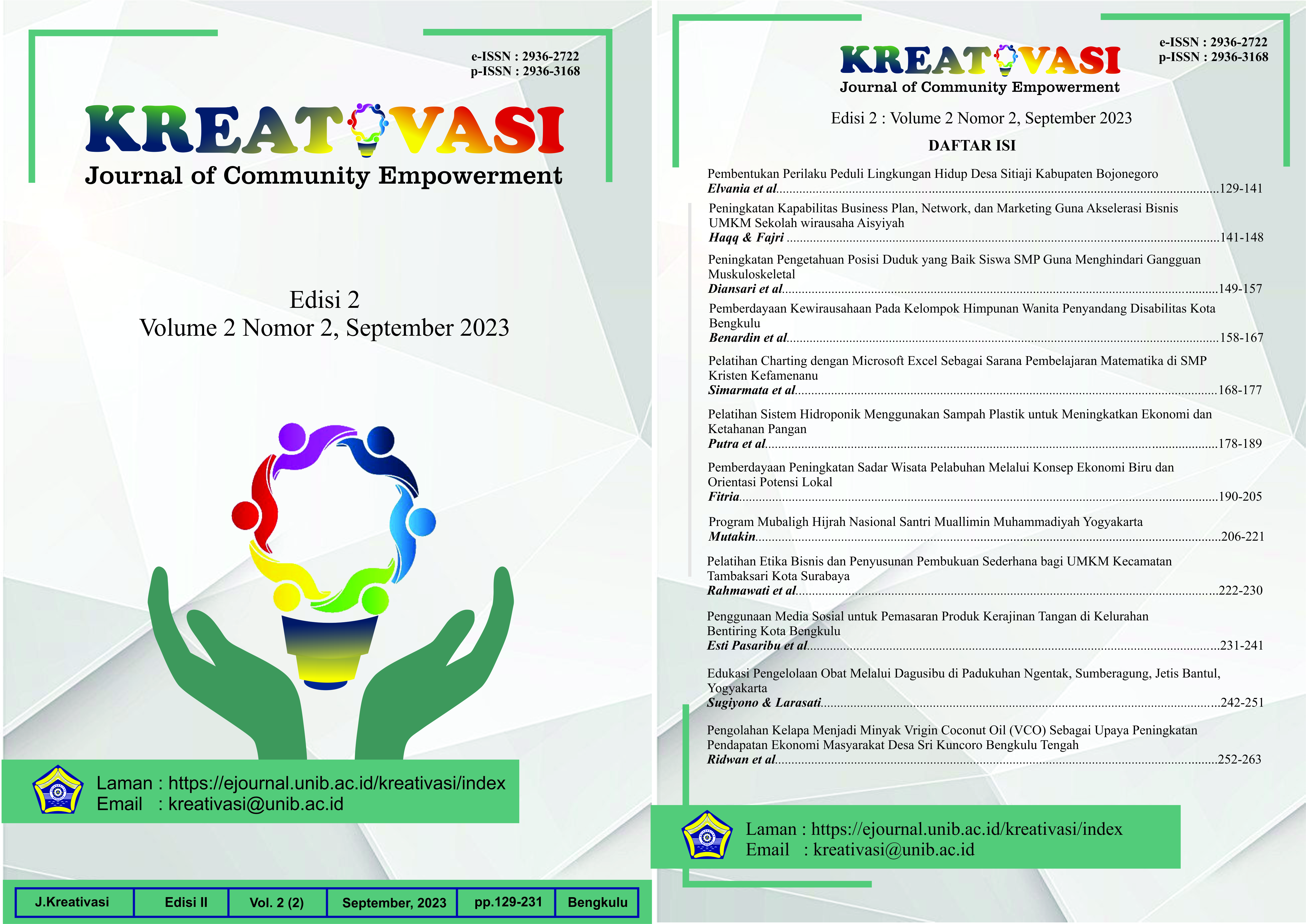Main Article Content
Abstract
Corona virus began to run the world in 2019, and started to enter Indonesia in 2020. The government of Indonesia then implemented an alert status telated to public health, and made effort to increase people’s immunity through various ways, where one of which is by vaccination. However, there is a lot of Indonesian refuse to take the vaccine due to their believe, and the massive publication in media that sayas a lot of people die since they had vaccination. Institut Teknologi dan Bisnis Sabda Setia collaborate with Dinas Kesehatan, Pengendalian Penduduk, dan Keluarga Berencana socializing the benefits of vaccination, especially the third vaccination called booster to the community in Bengkayang regency. The socialization attended by 100 people from all over Bengkayang. At the end of the socialization, both parties agreed to sign a declaration of the willingness of all officials to carry out the third vaccine.
Keywords
Article Details
Copyright (c) 2023 Wanda Novita, Raymond Wahyudi, Sebastian, Alip Hanoky

This work is licensed under a Creative Commons Attribution-ShareAlike 4.0 International License.
- This statement is a commitment from the author, to respect copyright, both in terms of quoting the work of others, as well as in the use of journal content.
- If needed, the author can send a statement of authenticity of the manuscript. With the receipt of an article by the Editor of Kreativasi - Journal of Community Empowerment, the article submitted has the copyright held by Kreativasi - Journal of Community Empowerment:
- Kreativasi - Journal of Community Empowerment has the right to reproduce and distribute articles that have been published in journals.
- The author is not permitted to publish the same article that has been published in this journal.
References
- Amanah. S. (2017). Makna Penyuluhan dan Transformasi Perilaku Manusia. Jurnal Penyuluhan, 4(1), 63–67.
- BPS. (2022). Kabupaten Bengkayang Dalam Angka Periode 2022. Diakses pada tanggal 04 Februari 2023, Pukul 22:37 pada website https://bengkayangkab.bps.go.id/publication/2022/02/25/fe2f1189f41f77cac5adc614/kabupaten-bengkayang-dalam-angka-2022.html
- Elidiya, A., Abdul Nasser, G., Dhanu, I., Himayani, R., & Ismunandar, H. (2021). Vaksin covid-19 : tinjauan pustaka. Jurnal Medula, 19(April), 141.
- Kedarup, P., & Kesehatan, A. (2020). Keputusan Presiden (Keppres) Nomor 11 Tahun 2020 tentang Penetapan Kedaruratan Kesehatan Masyarakat Covid-19. Sekretariat Negara, 031003, 1–2.
- Kesehatan, P. M. (2020). Compass. Peraturan Menteri Kesehatan No 9, 9–19. https://doi.org/10.4324/9781003060918-2
- Korn, L., Böhm, R., Meier, N. W., & Betsch, C. (2020). Vaccination as a social contract. Proceedings of the National Academy of Sciences of the United States of America, 117(26), 14890–14899. https://doi.org/10.1073/pnas.1919666117
- Pemerintah Republik Indonesia. (2019). Peraturan Pemerintah Pengganti Undang-Undang Republik Indonesia Nomor 1 Tahun 2020 tentang Kebijakan Keuangan Negara dan Stabilitas Sistem Keuangan Untuk Penanganan Pandemi Covid-19 dan/atau Dalam Rangka Menghadapi Ancaman Yang Membahayakan Perekonomian N. 2019(1), 46.
- Puteri, A. E., Yuliarti, E., & Maharani, N. P. (2022). Analysis of the Implementation of the Covid-19 Vaccination Policy in Indonesia. Jurnal Ilmu Administrasi, 19(1), 122–130. http://jia.stialanbandung.ac.id/index.php/jia/article/view/863
- Sidarta, C., Kurniawan, A., Lugito, N. P. H., Siregar, J. I., Sungono, V., StevenHeriyanto, R., Sieto, N. L., Halim, D. A., Jodhinata, C., Rizki, S. A., Sinaga, T. D., Marcella, C., Wijovi, F., Susanto, B., Marcella, E., Wibowo, J., Anurantha, J. J., Imanuelly, M., Indrawan, M., & Heryadi, N. K. (2022). The Determinants of COVID-19 Vaccine Acceptance inSumatra. Kesmas, 17(1), 32–39. https://doi.org/10.21109/kesmas.v17i1.4958
- Suyana, N., Ati, A. P., & Widiyarto, S. (2019). Metode Partisipatori untuk Meningkatkan Kemampuan Menulis Argumentasi Pada Siswa MTs Nurul Hikmah Kota Bekasi. Linguista: Jurnal Ilmiah Bahasa, Sastra, Dan Pembelajarannya, 2(2), 80. https://doi.org/10.25273/linguista.v2i2.3702
References
Amanah. S. (2017). Makna Penyuluhan dan Transformasi Perilaku Manusia. Jurnal Penyuluhan, 4(1), 63–67.
BPS. (2022). Kabupaten Bengkayang Dalam Angka Periode 2022. Diakses pada tanggal 04 Februari 2023, Pukul 22:37 pada website https://bengkayangkab.bps.go.id/publication/2022/02/25/fe2f1189f41f77cac5adc614/kabupaten-bengkayang-dalam-angka-2022.html
Elidiya, A., Abdul Nasser, G., Dhanu, I., Himayani, R., & Ismunandar, H. (2021). Vaksin covid-19 : tinjauan pustaka. Jurnal Medula, 19(April), 141.
Kedarup, P., & Kesehatan, A. (2020). Keputusan Presiden (Keppres) Nomor 11 Tahun 2020 tentang Penetapan Kedaruratan Kesehatan Masyarakat Covid-19. Sekretariat Negara, 031003, 1–2.
Kesehatan, P. M. (2020). Compass. Peraturan Menteri Kesehatan No 9, 9–19. https://doi.org/10.4324/9781003060918-2
Korn, L., Böhm, R., Meier, N. W., & Betsch, C. (2020). Vaccination as a social contract. Proceedings of the National Academy of Sciences of the United States of America, 117(26), 14890–14899. https://doi.org/10.1073/pnas.1919666117
Pemerintah Republik Indonesia. (2019). Peraturan Pemerintah Pengganti Undang-Undang Republik Indonesia Nomor 1 Tahun 2020 tentang Kebijakan Keuangan Negara dan Stabilitas Sistem Keuangan Untuk Penanganan Pandemi Covid-19 dan/atau Dalam Rangka Menghadapi Ancaman Yang Membahayakan Perekonomian N. 2019(1), 46.
Puteri, A. E., Yuliarti, E., & Maharani, N. P. (2022). Analysis of the Implementation of the Covid-19 Vaccination Policy in Indonesia. Jurnal Ilmu Administrasi, 19(1), 122–130. http://jia.stialanbandung.ac.id/index.php/jia/article/view/863
Sidarta, C., Kurniawan, A., Lugito, N. P. H., Siregar, J. I., Sungono, V., StevenHeriyanto, R., Sieto, N. L., Halim, D. A., Jodhinata, C., Rizki, S. A., Sinaga, T. D., Marcella, C., Wijovi, F., Susanto, B., Marcella, E., Wibowo, J., Anurantha, J. J., Imanuelly, M., Indrawan, M., & Heryadi, N. K. (2022). The Determinants of COVID-19 Vaccine Acceptance inSumatra. Kesmas, 17(1), 32–39. https://doi.org/10.21109/kesmas.v17i1.4958
Suyana, N., Ati, A. P., & Widiyarto, S. (2019). Metode Partisipatori untuk Meningkatkan Kemampuan Menulis Argumentasi Pada Siswa MTs Nurul Hikmah Kota Bekasi. Linguista: Jurnal Ilmiah Bahasa, Sastra, Dan Pembelajarannya, 2(2), 80. https://doi.org/10.25273/linguista.v2i2.3702
